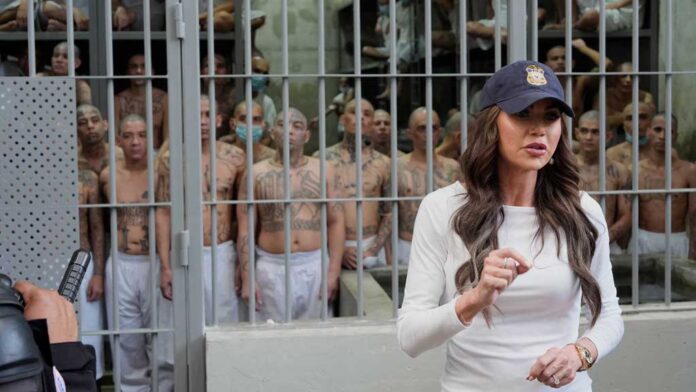A U.S. appeals court on Wednesday upheld a lower court’s temporary halt on the Trump administration’s deportation of certain Venezuelan immigrants under a rarely used 18th-century law.
The ruling from the U.S. Circuit Court of Appeals for the D.C. Circuit deals a setback to Republican President Donald Trump, who had argued that U.S. District Judge James Boasberg’s two-week suspension of deportations under the 1798 Alien Enemies Act infringed upon the executive branch’s authority over national security decisions.
In a 2-1 vote, a three-judge panel upheld Boasberg’s decision, with U.S. Circuit Judge Justin Walker—appointed by Trump during his first term—dissenting.
Trump invoked the Alien Enemies Act on March 15 to expedite the deportation of alleged members of the Venezuelan gang Tren de Aragua, using a law historically associated with the internment of Japanese, Italian, and German immigrants during World War II.
The ensuing legal battle has underscored Trump’s efforts to exert influence over the federal judiciary, an independent branch designed to check executive power.
Judge Boasberg issued the temporary block on March 15 following a lawsuit from the American Civil Liberties Union (ACLU). However, the Trump administration allowed two deportation flights already en route to proceed to El Salvador, where 238 Venezuelan men were handed over to authorities and placed in the country’s Terrorism Confinement Center.
DHS Secretary Visits El Salvador Prison
The court’s ruling coincided with a visit by U.S. Homeland Security Secretary Kristi Noem to the El Salvador mega-prison housing the Venezuelans deported by the U.S.
During her tour, Noem walked past cells containing dozens of shirtless men wearing white pants, many tattooed, who remained silent as she observed them. A pool report described one of the detention areas as “uncomfortably warm,” with temperatures exceeding 90 degrees Fahrenheit (32 degrees Celsius).
As Noem exited one of the barracks holding Venezuelan detainees, a sudden outburst of noise turned into a chant, though the words were unclear, the report stated. The prisoners reportedly spend nearly all day in their cells, leaving only briefly for exercise or medical visits.
Noem, a vocal supporter of Trump’s strict immigration policies, also planned a meeting with El Salvador’s President Nayib Bukele. Bukele’s administration, closely aligned with Trump, has agreed to hold the deported migrants in exchange for $6 million.
The U.S. and El Salvador signed an updated memorandum of cooperation, revising a security agreement between the two nations. Noem later posted on social media that the agreement would ensure “fugitives’ criminal records are shared between America and El Salvador.”
Legal Battle and Due Process Concerns
Many relatives of the deported Venezuelans deny the government’s claims that they have gang affiliations. Attorneys representing one deportee, a Venezuelan professional soccer player and youth coach, argued that U.S. officials mistakenly identified him as a gang member because of a tattoo of a crown—a tribute to his favorite soccer team, Real Madrid.
In her reasoning for upholding Boasberg’s order, U.S. Circuit Judge Patricia Millett, appointed by Democratic President Barack Obama, stated that the government was failing to provide the deportees with an opportunity to challenge their alleged gang ties before being expelled.
“Nazis got better treatment under the Alien Enemies Act than has happened here,” Millett remarked during a hearing on Monday, addressing the Trump administration’s request for an appeal.
Trump’s attorney, Drew Ensign, responded: “We certainly dispute the Nazi analogy.”
U.S. Circuit Judge Karen Henderson, appointed by Republican President George H.W. Bush, noted in her ruling that it was unclear whether the presence of Tren de Aragua members in the U.S. constituted an “act of war” as defined under the Alien Enemies Act.
“An invasion is a military affair, not one of migration,” Henderson wrote.
During Monday’s hearing, Ensign argued that the courts should not interfere with the president’s authority over foreign affairs and national security.
In his dissenting opinion, Walker contended that blocking the deportations could cause “irreparable harm to ongoing, highly sensitive international diplomacy and national-security operations.” He also asserted that the case should have been brought in Texas, where the migrants are detained, rather than Washington, D.C.
Next Steps
The Trump administration may now seek a review from the U.S. Supreme Court, which currently holds a 6-3 conservative majority.
ACLU attorney Lee Gelernt, who led the case, praised the appeals court ruling, stating it “stops the immediate removal of hundreds of individuals, without any due process, to a notorious prison.”
Meanwhile, Judge Boasberg is separately considering whether the Trump administration violated his order by failing to recall deportation flights already in progress at the time of his ruling.



